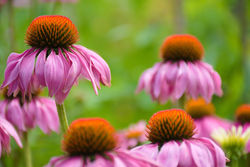20 easy-to-grow flowering plants that come back every year
- Lars Wildes
- Jan 30, 2023
- 5 min read
Updated: Feb 4, 2023
Are you looking to add a few plants to your garden that will come back year after year? Meet the perennial plants.
Unlike annuals, which only live for one season, perennials stick around for a few years, bringing their colors and textures back to your borders and containers every spring and summer.
They come in all shapes and sizes, from small flowers to large bushes and trees. And many perennials can bloom in spring, summer, fall or even winter. A few even have pretty leaves all year round, so your garden will never truly be empty.
Choosing the right perennials for your garden
When selecting perennials for your garden, think about where you want to plant them. Are you going for borders? Containers? Hanging baskets? Walkways or garden edges?
Some like full sun. Others prefer shade. Some like dry soil, and others like it moist.
And don't forget to think about how tall they'll get and when they'll bloom. It’s always best to mix and match them with other plants, like shrubs and annuals, to have a garden that always has something in bloom.
Here's a list of 20 great low-maintenance perennials to try. And a few tips on how to make them happy in your garden.
The best thing about the perennials in this easy-to-grow list is that they won’t take a ton of work to plant and maintain… but your garden will look like a Chelsea Flower Show winner. We won’t tell your neighbors your secret, don’t worry.
20 low-maintenance perennials for beginners to plant
1. Black-eyed Susan (Rudbeckia hirta)

Black-eyed Susans are native wildflowers that are easy to grow, with yellow or orange petals and a dark brown center. They also make great cut flowers, letting you bring their beauty into every room of your house.
Height: 2-3 feet
Sun exposure: Full sun to partial shade
Soil type: well-drained
2. Coneflower (Echinacea purpurea)

Coneflowers are hardy perennials that produces large, daisy-like flowers in shades of pink, purple, orange, and yellow. Plant these in every color for flowers that come back year after year. They also make great cut flowers.
Height: 2-4 feet
Sun exposure: Full sun
Soil type: well-drained
3. Daylily (Hemerocallis)

Daylillies are hardy perennials with large, trumpet-shaped flowers in a wide range of colors.
Height: 1-3 feet
Sun exposure: Full sun to partial shade
Soil type: well-drained
4. Iris (Iris spp.)

Plant a few irises and you'll see why artists love to pain them. These are hardy perennials that produce large, showy flowers in a wide range of colors.
Height: 1-3 feet
Sun exposure: Full sun to partial shade
Soil type: well-drained
5. Lavender (Lavandula spp.)

Oh the smell of lavender! It's 100% summer to me. I plant it around the edges of my borders and keep it trimmed low. You can usually cut it back after the first flowering and get 1-2 more flowerings.
Height: 1-2 feet
Sun exposure: Full sun
Soil type: well-drained
6. Lilac (Syringa spp.)

Lilacs are hardy perennials that produce fragrant, clusters of purple, pink, or white flowers. Keep in mind that this plant is more of a bush and can get up to 12 feet tall. It is great at the back of a border though, and the smell of the purple flowers is incredible
Height: 4-8 feet
Sun exposure: Full sun
Soil type: well-drained
7. Perennial Salvia (Salvia spp.)

This is one of my favorites in the graden. Perennial salvia is a hardy perennial that produces spikes of colorful flowers in shades of blue, purple, red, and pink.
Height: 1-3 feet
Sun exposure: Full sun
Soil type: well-drained
8. Peony (Paeonia spp.)

Peonies are gorgeous, right? This hardy perennial produces large, fragrant flowers in shades of pink, red, white, and yellow. They make great cut flowers, too... and the smell is intoxicating.
Height: 2-3 feet
Sun exposure: Full sun
Soil type: well-drained
9. Phlox (Phlox spp.)

One of the best things about phlox is how great it works on the edges of your borders and walkways. It's a low-growing perennial with clusters of colorful flowers in shades of pink, purple, red, and white.
Height: 1-3 feet
Sun exposure: Full sun to partial shade
Soil type: well-drained
10. Rose (Rosa spp.)

Roses aren't my favorite, but they are quite easy to grow. And they make great cut flowers.
Height: 2-6 feet
Sun exposure: Full sun
Soil type: well-drained
11. Shasta Daisy (Leucanthemum x superbum)

Does anything scream summer like a Shasta Daisy? These are hardy perennials with large, white, daisy-like flowers with yellow centers. They also make for great cut flowers in vases.
Height: 2-3 feet
Sun exposure: Full sun
Soil type: well-drained
12. Tulip (Tulipa spp.)

Here's a must-have for every beginner gardener. Tulips are easy to plant and they bloom in early spring, giving you color right when you need it — just as the cold winter is melting away.
Height: 8-24 inches
Sun exposure: Full sun
Soil type: well-drained
13. Yarrow (Achillea millefolium)

Yarrow is another great gap filler in my garden. It's a hardy perennial with clusters of small, yellow, white, or pink flowers. It's also super easy to divide, giving you more of it for other gaps in your border.
Height: 1-3 feet
Sun exposure: Full sun to partial shade
Soil type: well-drained
14. Sedum (Sedum spp.)

Sedum is a low-growing perennial with clusters of small, star-shaped flowers in shades of pink, red, and yellow.
Height: 6-12 inches
Sun exposure: Full sun
Soil type: well-drained
15. Coreopsis (Coreopsis spp.)

Here's another easy-to-grow perennial that gives you large, daisy-like flowers in shades of yellow, orange, and red.
Height: 1-3 feet
Sun exposure: Full sun
Soil type: well-drained
16. Echinacea (Echinacea spp.)

Everyone who visits my garden loves the echinacea I have growing. It's a hardy perennial that produces large, daisy-like flowers in shades of pink, purple, orange, and yellow. Hopefully, you'll love it just as much in your space.
Height: 2-4 feet
Sun exposure: Full sun
Soil type: well-drained
17. Foxglove (Digitalis spp.)

Here's one that the bees will go crazy for! Foxgloves are hardy perennials that produce spikes of bell-shaped flowers in shades of pink, purple, white, and yellow. They don't make great cut flowers, but they do throw their seeds, giving you more of these beautiful flowers in the years to come.
Height: 2-5 feet
Sun exposure: Partial shade
Soil type: well-drained
18. Gaillardia (Gaillardia spp.)

Gaillardia is a low border plant with large, daisy-like flowers in shades of red, orange, and yellow. Save this one for edges and walkways where you really want a burst of vibrant color.
Height: 1-2 feet
Sun exposure: Full sun
Soil type: well-drained
19. Heuchera (Heuchera spp.)

Here's another plant that's great for the middle of your flower borders. It's a hardy perennial that produces spikes of small, bell-shaped flowers in shades of pink, red, and white.
Height: 6-12 inches
Sun exposure: Partial shade
Soil type: well-drained
20. Monarda (Monarda spp.)

Here's another perennial that the bees will love. And beginner gardeners will like because it's super easy to grow. Monarda (Bee Balm) is a hardy perennial with spikes of colorful flowers in shades of pink, purple, red, and white.
Plant it in your garden and you'll quickly see why the bees love it!
Height: 2-4 feet
Sun exposure: Full sun
Soil type: well-drained
As with all flowers and plants, it’s always best to check the exact requirements for the plant you have or plan to have in your garden with your local plant nursery or gardening expert. You can also drop me a line and ask for help with what works in your area.
When to plant perennials
The best time to plant perennials is in the fall and spring.
This gives them time to get settled before the cold winter or hot summer. Fall is a great time because the soil is still warm.
Planting in the summer is doable, but you'll need to water each plant more often.
What makes these perennials so easy to grow?
The plants on my list are great choices because they don't need a lot of extra care, like pinching, staking or deadheading.
They're also resistant to pests and diseases and might not be as tasty to deer and other visitors (important if your garden is open to nature).
Plus, most of these low-maintenance perennials can live for over five years and adapt to different types of gardens.
They also don't spread all over the place and can grow and bloom well without being divided. Plus, they're tough enough to hold their own against other plants and can grow in most parts of the world — including North America (Zones 2 to 9).









Comments